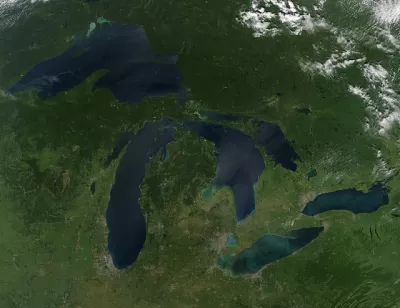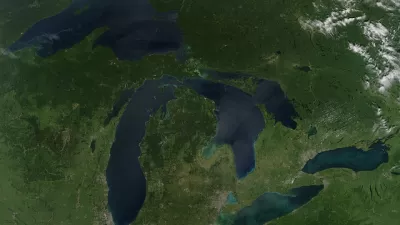The city of Waukesha will be able to pump water from the Great Lakes to replace its contaminated local ground water supply. It's the first community outside the Great lakes watershed allowed to divert water under terms of the Great Lakes Compact.

"A suburban Milwaukee city won a hard-fought battle Tuesday to draw its drinking water from Lake Michigan," reports the Chicago Tribune news service. The decision is "a key test of a regional compact designed to safeguard the Great Lakes region's abundant but vulnerable fresh water supply," according to the article.
Waukesha was the first city to make use of a provision in the 2008 Great Lakes Compact that allows communities just outside the Great lakes watershed to request diversions of water outside the watershed. Waukesha proposed the $207 million diversion project after discovering that "groundwater wells on which the city has long relied are contaminated with radium." Waukesha will now be allowed to pump 8.2 million gallons of water a day from Lake Michigan.
According to a separate article by Dan Kraker:
A panel of representatives from the eight Great Lakes states (plus two Canadian provinces) gave the plan tentative approval in May. But it required Waukesha to reduce the amount of water it would withdraw daily from 10.1 million gallons to 8.2 million gallons, and to shrink the size of the area it would provide with water to 57 percent of the original proposal.
The controversial proposal attracted plenty of opposition over the years, including when Planetizen first picked it up in January 2011. In September 2015, several local newspapers raised concerns about the end of the project's trail, when Waukesha will pumps treated wastewater back into Lake Michigan. As recently as May, the decision to cut the daily volume and delivery area of the project prompted a discussion about growth in the suburban area of Waukesha.
FULL STORY: Wisconsin city allowed unprecedented access to Lake Michigan for drinking water

Planetizen Federal Action Tracker
A weekly monitor of how Trump’s orders and actions are impacting planners and planning in America.

Maui's Vacation Rental Debate Turns Ugly
Verbal attacks, misinformation campaigns and fistfights plague a high-stakes debate to convert thousands of vacation rentals into long-term housing.

Restaurant Patios Were a Pandemic Win — Why Were They so Hard to Keep?
Social distancing requirements and changes in travel patterns prompted cities to pilot new uses for street and sidewalk space. Then it got complicated.

In California Battle of Housing vs. Environment, Housing Just Won
A new state law significantly limits the power of CEQA, an environmental review law that served as a powerful tool for blocking new development.

Boulder Eliminates Parking Minimums Citywide
Officials estimate the cost of building a single underground parking space at up to $100,000.

Orange County, Florida Adopts Largest US “Sprawl Repair” Code
The ‘Orange Code’ seeks to rectify decades of sprawl-inducing, car-oriented development.
Urban Design for Planners 1: Software Tools
This six-course series explores essential urban design concepts using open source software and equips planners with the tools they need to participate fully in the urban design process.
Planning for Universal Design
Learn the tools for implementing Universal Design in planning regulations.
Heyer Gruel & Associates PA
JM Goldson LLC
Custer County Colorado
City of Camden Redevelopment Agency
City of Astoria
Transportation Research & Education Center (TREC) at Portland State University
Jefferson Parish Government
Camden Redevelopment Agency
City of Claremont





























